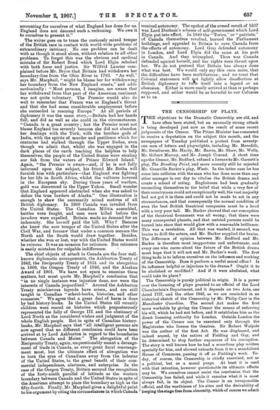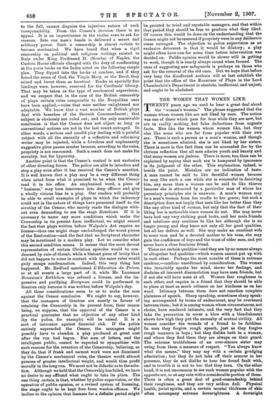THE CENSORSHIP OF PLAYS. T HE objections to the Dramatic Censorship
are old, and have often been stated, but an unusually strong attack is being developed just now as the result of some recent judgments of the Censor. The Prime Minister has consented to receive a deputation on the subject this month, and the newspapers of Tuesday published a protest from seventy- one men of letters and playwrights, including Mr. Meredith, Mr. Swinburne, Mr. Hardy, Mr. Barrie, Mr. Shaw, Mr. Wells, Mr. Gilbert Murray,. and Mr. Joseph Conrad. A short time ago the Censor, Mr. Redford, refused a license to Mr. Garnett's play, The Breaking Point, and more recently still he rejected Mr. Granville Barker's play, Waste. In the latter case he has come into collision with the man who has done more than any other manager in our day to' vitalise the British drama and create a school of acting. Englishmen had been gradually reconciling themselves to the belief that while a very few of their countrymen could act exceptionally well, the vast majority had not got it in them and could not be made to act in any circumstances, and that consequently the normal condition of even the best British theatrical companies must be a head with a very poor tail. Mr. Barker showed that our conception of the theatrical firmament was all wrong ; that there were many unsuspected planets, and that untried persons could be turned into stars that would glow with a reasonable brilliance. This was a revelation. All that was wanted, it seemed, was brains to drill the actors, and Mr. Barker supplied the brains. The difference of opinion between Mr. Redford and Mr. Barker is therefore most inopportune and unfortunate, and every one who caresrabont the future of the British drama must hope that it will not end Mr. Barker's work. The first thing to do is to inform ourselves on the influence and working of the Censorship. Does it perform a useful moral office ? Is its influence helpful or injurious to the drama ? Ought it to be abolished or modified ? And if it were abolished, what could take its place ?
The Censorship is purely political in origin. It is a power over the licensing of plays granted to an official of the Lord Chamberlain's Department, and it depends on two Acts, one dated 1737, and the other 1843, as we are reminded in an historical sketch of the Censorship by Mr. Philip Carr in the Manchester Guardian. The second Act makes the first more workable by giving the Censor the means of enforcing his will, which he had not before, and it establishes him as the direct licensing authority for London. Outside London the power of the Censor can be exercised only through the Magistrates who license the theatres. Sir Robert Walpole was the author of the first Act. He was displeased, and indeed scared, by the satires of Fielding and Gay, and he determined to stop further exposures of his corruption. The story is well known how be had a scurrilous play written specially for him, and showed extracts from it to a scandalised House of Commons, passing it off as Fielding's work. To- day, of course, the Censorship is chiefly exercised, not as a political, but as a moral purge. At least it is used with that intention, however questionable its ultimate effects may be. We ourselves cannot resist the conclusion that the Censorship has failed, and while it remains what it is must always fail, in its object. The Censor is an irresponsible official, and the worthiness of his aims and the desirability of keeping the stage free from obscenity, which of coarse we admit
to the full, cannot disguise the injurious nature of such irresponsibility. From the Censor's decision there is no appeal. It is an impertinence in the victim even to ask for reasons. Into one man's hands is delivered a secret and arbitrary power. Such a censorship is almost certain to become mechanical. We have heard that when a rigid censorship on political and religious writings existed in Italy under King Ferdinand II. (Bomba) of Naples, the Custom House officials charged with the duty of confiscating at the ports books on the Index acted on the following simple plan. They dipped into the books at random, and if they found the name of God, the Virgin Mary, or the Devil, they seized and burnt them as heretical. Books in specially fine bindings were, however, reserved for the Cardinals' library. That may be taken as the type of mechanical supervision; and we suspect that in the case of the British censorship of plays certain rules comparable to the Neapolitan ones have been applied,—rules that were neither enlightened nor adaptable. We know that a vast number of British plays deal with breaches of the Seventh Commandment ; that subject is obviously not ruled out; and the only conceivable conclusion is that the Censor does not object so long as conventional notions are not in the last resort outraged. In other words, a serious and candid play dealing with a painful lubject with all the sincerity of a reflective and reforming writer may be rejected, while a frivolous and unpleasantly suggestive piece passes muster because, according to the rules, propriety is not renounced. Such a result does not make for morality, but for hypocrisy.
Another point is that the Censor's control is not exclusive of other directing forces. The police are able to interfere and stop a play even after it has received the Censor's sanction. It is well known that a play may be a very different thing when acted from what it promised to be when the Censor read it in his office. An emphasised word, a piece of "business," may turn innocence into deep offence and give a wholly vicious bias to a play. Our readers will probably be able to recall examples of plays in which the indecency could not in the nature of things have presented itself to the scrutiny of the Censor, who merely reads the dialogue with- out even demanding to see the stage directions. If it is necessary to name any more conditions which make the Censorship in its present form ineffectual, we might record the fact that plays written before Walpole's Act require no license—thus one might stage unchallenged the worst pieces of the Restoration—and the fact that no Scriptural character may be mentioned in a modern play. Let us consider what this second condition means. It means that the most devout representation of certain Christian episodes would be con- demned by rule-of-thumb, while a blatant piece of levity that did not happen to come in contact with the same rules would gaily escape condemnation. Indeed, this very thing has happened. Mr. Redford sanctioned L'Edwation du Prince, or at all events a large part of it, while Mr. Laurence Flousman's Bethlehem was refused a license, and the im- pressive and purifying Everyman could be performed in theatres only because it was written before Walpole's day.
All these considerations seem to us to make the case against the Censor conclusive. We ought to say, however, that the managers of theatres are mostly in favour of retaining the Censorship in its present form, their reason being, we suppose, that the approval of the Censor is a practical guarantee that no objection of any other kind (by the police, for example) will be raised. It is a sort of insurance against financial risk. If the police entirely superseded the Censor, the managers might possibly have to abandon a play produced at great cost after the run had begun. But men of letters, and the intelligent public, cannot be expected to sympathise with such reasons for the retention of the Censorship, believing, as they do, that if frank and earnest work were not dismissed by the Censor's mechanical rules, the theatre would attract persons of greater intellectual weight, and would thus profit morally in the long run. We must not be didactic as to the solu- tion. Although we hold that the Censorship has failed, we have no desire to say offhand what ought to take its place. The one thing certain is that, whether by police supervision, or the operation of public opinion, or a revised system of licensing, the stage ought to be kept free from wanton offence. We incline to the opinion that licenses for a definite period might be granted to tried and reputable managers, and that within that period they should be free to produce what they liked. Of course this would be done on the understanding that the license might not be renewed if propriety were in any deliberate sense outraged. The objection to police supervision as an exclusive deterrent is that it would be dilatory ; a play might often have run for some time before intervention was decided on. Public opinion would be slower still in getting to work, though it is nearly always sound when formed. The onus of suggesting new safeguards is perhaps on those who ask for the removal of the old ones. But we hope that before very long the disaffected authors will at last establish the point that the office of the Examiner of Plays in the Lord Chamberlain's Department is obsolete, ineffectual, and unjust, and ought to be abolished.































































 Previous page
Previous page